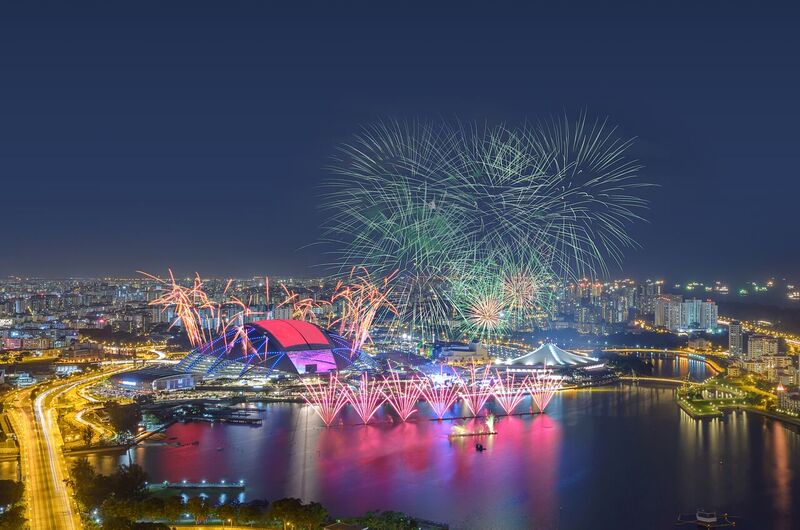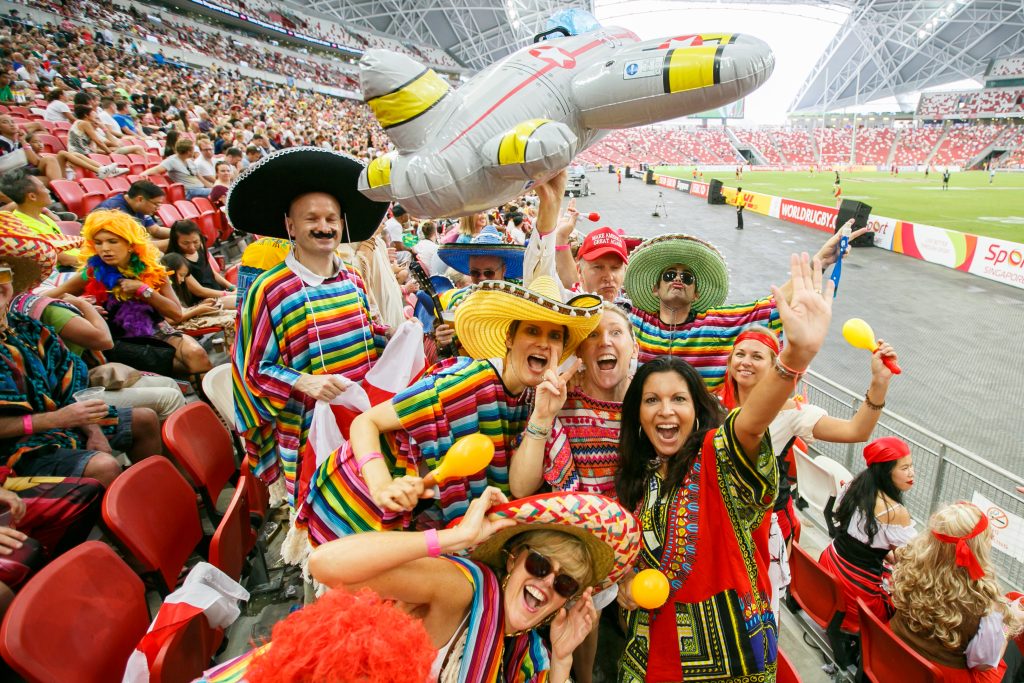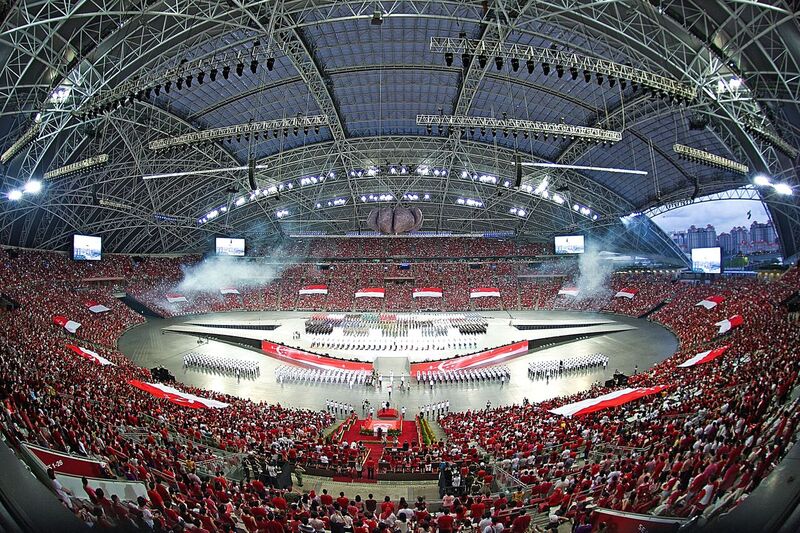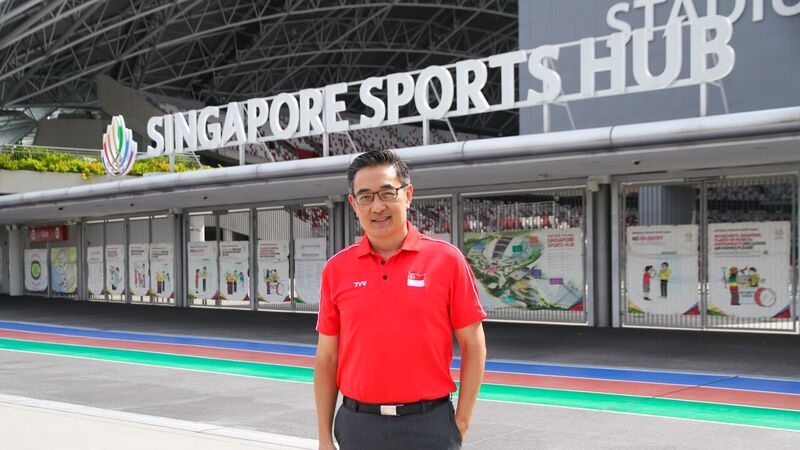- April 16, 2018
- Posted by: SportsV
- Categories: Features, Home News, Industry News, Interviews, News

Katie McIntyre speaks with Oon Jin Teik, CEO at the Singapore Sports Hub, about the challenges of managing and operating a multi-purpose, multi-venue complex and what his aspirations are for the evolution of the hub moving forward.
Firstly, can you start off by telling us about yourself, your background and career highlights to date?
My name is Oon Jin Teik and I was honoured to be appointed as the Chief Executive Officer (CEO) of the Singapore Sports Hub early this year. The Singapore Sports Hub is one of the largest public-private-partnership (PPP) social infrastructure projects in the world. My journey with the organisation started in 2014, when I joined as Chief Operating Officer (COO).
Prior to that, I served as the Group Executive Vice-President and CEO of China, at Hyflux Ltd – an environmental water solutions company. Before joining Hyflux, I was the CEO of the Singapore Sports Council, where I was responsible for developing our nation’s sports ecosystem, and growing sports excellence, participation and the industry.
I started my career with US chemical maker DuPont for a decade before joining the National Starch and Chemical Company as Head of Customer Solutions and Innovation, I am probably best known as one of the Singaporean foursome (Ang Peng Siong, David Lim, Oon Jin Gee and I) who competed at the 1984 Los Angeles Olympics swimming events.
Having been appointed CEO of the Singapore Sports Hub at the beginning of 2018, what do you foresee as being your biggest challenges and indeed key objectives for the year ahead and into the future?
The Singapore Sports Hub is a highly complex, state-of-the-art, fully integrated sports, entertainment and lifestyle hub. Our vision is to be the region’s premier destination on all three fronts, as well as make the Singapore Sports Hub an icon of national pride through the creation and delivery of extraordinary experiences that bind us all – be it as a competitor, participant or spectator. We exist to deliver on the project for Singapore and ensure strong returns for our investors.
I consider myself very fortunate to have a team that is fully committed to deliver on our vision. Our greatest challenge is a very good one because it involves working through all the exciting ideas that the team has, and identifying the best ones to carry them forward. Moving ahead, one key focus for us is to stay “fit-for-purpose” in an ever-changing, highly competitive sports and entertainment playing field.

The Singapore Sports Hub is a S$1.33bn PPP project – one of the largest of its kind in the world – and is poised to be the region’s premier sports, entertainment and lifestyle hub. Can you tell our readers more about the venue, it’s USP’s, facilities and any upcoming developments moving forward?
The Singapore Sports Hub is a multi-award-winning venue. It won the Project Finance International (PFI) award in London in 2011, World Architecture Festival Awards for Best Future Project in the leisure-led development category in 2013, and Sports Building of the Year in 2014.
It is comprised of a unique cluster of best-in-class sports, entertainment and lifestyle facilities, enviably located on a 35-hectare site within the city of Singapore. Its centrepiece is a new 55,000-capacity National Stadium, which boasts the largest free-spanning dome in the world with a retractable roof and movable tiered seating designed to host Football, Rugby, Athletics, Cricket, entertainment events, and more.
There is also an 11,000-capacity iconic Singapore Indoor Stadium for sports and entertainment events, a 6,000-capacity OCBC Aquatic Centre built to host international events and public swims, a 3,000-capacity OCBC Arena with six halls that are scalable and flexible in layout.
We have a Water Sports Centre where visitors can enjoy kayaking, canoeing, dragon boating and pedal boating; a 41,000 sqm Kallang Wave Shopping Mall with experiential retail features like an indoor climbing wall; a Splash-N-Surf facility featuring a kids water playground, Stingray (a wave pool) and a lazy river.
Additionally, our venues include the Singapore Sports Museum, Singapore Youth Olympic Games Museum, Shimano Cycling World, our Sports Hub Library and many community facilities, including beach volleyball, outdoor courts for futsal, basketball and netball, lawn bowls, giant chess, skate park, running and cycling paths.
From the afore-mentioned, it is easy to see that, competition wise, the integrated model of Singapore Sports Hub is the first of its kind in the world. Unlike most stadiums in the world, which are built for the sole purpose of hosting major Games (e.g. Asian Games), the Singapore Sports Hub was designed for that and “24/7 legacy use”. Importantly, it is also built for the community and to support our government’s vision to help Singaporeans live better through sports.
By being multi-venue and multi-capacity, we can host a variety of events, ranging from sports and entertainment, to lifestyle and community events all year round, including the major ones like the SEA Games and ASEAN Para Games. Many cities have seen and understood our model. Visitors to the Singapore Sports Hub can always look forward to an exciting and vibrant programme calendar that is curated to serve the full spectrum of our patron demographics.
Another unique selling proposition of the Singapore Sports Hub that is unrivalled anywhere else in the world lies in that we have a dedicated team to plan, operate, maintain and manage the venue on a daily basis. Our global and highly experienced team is always on site to provide a full range of support for promoters, including operations, marketing, and ticketing support.
A new attraction – the Sports, Arts & Heritage Trail – is set to open at the Singapore Sports Hub in 2019 to coincide with Singapore’s Bicentennial Commemoration. The occasion celebrates 200 years of nation-building, since the arrival of Sir Stamford Raffles. The Trail will pay tribute to the rich history of Singapore, as well as re-present the salient features of SSH as the site of the former Kallang Civil Aerodrome and Kallang National Stadium. The long history of Kallang Basin as a harbour and maritime port pre-dates the arrival of the British two centuries ago. This is part of SSH’s community efforts to document and showcase our nation’s heritage at Kallang for all Singaporeans and visitors.
Another planned project that really captures the DNA of our venues is the Adventure Park. The Singapore Sports Hub is where everyone comes to play. With the addition of an Adventure Park, which will be built upon an outdoor adventure concept, we will have more offerings such as a Climbing Wall, Roller Glide and Tree Walk that are suitable for all ages.

As an Olympian and former CEO of the Singapore Sports Council – during which time you were also part of the team responsible for introducing the world’s first Formula 1 Night Race to Singapore – you now helm the highly complex Singapore Sports Hub, with the responsibility to contribute to the sports industry and tourism experience in Singapore, as well as put the Singapore Sports Hub on the world map amidst rising competition from countries in the region and beyond. How do you intend to deliver on these ‘going for gold’ objectives?
I’m proud to say that the Singapore Sports Hub Team has been delivering, and will continue to deliver for Singapore through our exciting and packed calendar of events for both Singaporeans and visitors to the city, year on year. In 2017, we hosted more than 200 events, including several international events that were held in Singapore for the first time. These include the International Champions Cup (ICC) featuring top-notch European clubs, WTA Finals, FINA, HSBC Singapore Sevens, UFC Fight Night, Monster Jam, just to name a few. On the entertainment front, we were the venue of choice for superstars like Ed Sheeran, Cold Play, Bruno Mars, Madonna, Katy Perry, Jay Chou, EXO, Super Junior and Jacky Cheung, amongst others.
We have welcomed approximately 2 million visitors a year since 2015, and have consistently kept to this number year on year. Last year, we saw 2.42 million event attendees and registered over 15-million footfall at our hub. We will work hard to keep our visitors coming.
Moving forward, the Singapore Sports Hub will leverage a ‘festival’ concept to broaden the experiential aspect of our programming. For example, during the World Cup season in the middle of this year, we will organise a Festival of Football. This programme will set the scene for the International Champions Cup (ICC), which will see European powerhouse clubs play here at the National Stadium. There will also be plans for World Cup game screenings for the community, along with many football-related fringe activities happening across SSH venues, over three months. [Note: Chelsea FC, FC Bayern and FC Inter Milan played at the ICC last year.]
In September, the Japan Summer Festival will take centre stage. The event is a collaboration with the Japan Association of Singapore. It is a celebration and display of Japan’s rich heritage here at SSH, made possible through the Land of the Rising Sun’s many food, fashion, sports and cultural offerings.
We look forward to welcoming both our local and overseas visitors to the Singapore Sports Hub where there is always something for everyone.

Fan engagement and the fan experience has evolved significantly over the last 5-10 years and will continue to evolve, with connectivity now expected as standard by millennials, who also demand money-can’t-buy experiences. How is the SSH gearing up for this sea-change?
The Singapore Sports Hub is currently in its fourth year of operations. Our priority in the initial years was venue readiness and integrating all the moving parts within this small “start-up city”. Next, we focused on enhancing the delivery of our services to host world-class events.
As we progress within a landscape that is also continuously evolving, our sight remains firmly fixed on ensuring that our venue stays “fit for purpose”, and that we understand the customer journey. Ultimately, operational excellence must be combined with service excellence.
Being customer centric is a critical success factor in our business. The voices of our customers (our key target stakeholders being working adults, youths, seniors, families, children and the less privileged) and the analysis of these voices is a top priority for us.
Of equal importance to our destination trade is ensuring that we have the right mix of offering to attract our target markets. To this end, using a customer experience roadmap to design our processes and enhance our offerings is an ongoing discipline for us.
This is not a short-term, one-off trendy thing for us to do; stakeholder engagement and experience is part of our core business.

From your perspective, what have been some of the most important developments in the sector? Whether in terms of technology, best practices or latest trends? And in which areas/industry niches do you see the biggest developments happening/needed moving forward?
When we read about the latest-and-greatest developments in sporting and in-kind venues, we often see the “sexy” portions and what’s on the outside, e.g. a customer ordering his food from the stadium seat and having it swiftly delivered to his seat. Rarely do such articles discuss the fundamentals (e.g. internal structures and systems, ICT foundation, supply chain process, corporate culture etc.), which will ensure the longevity and indeed, the relevance of these “sexy” developments in the future.
Many factors also need to be considered when we discuss developments in our sector. These include a country’s rate of development, the readiness of its local market, the availability of local suppliers, the demographic of its stakeholders, the presence of other venues, just to name a few.
At the Singapore Sports Hub, we are keenly aware and steely resolved to continue to build the foundation for growth, as well as time the implementation of growth projects according to market and venue readiness.
Ultimately, we want to be in a “ready to play” mode, now and in the journey ahead, so that we can truly be future ready for the global market.

Huge thanks to Oon Jin Teik, CEO at the Singapore Sports Hub, for taking the time to do this interview with us.
Images, courtesy: Singapore Sports Hub (SSH)

